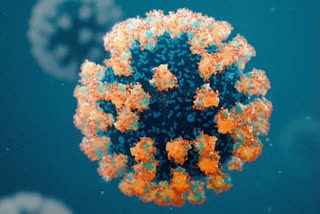New Delhi: Viju Vijyan, 32 and his father V Vijyan, 70 were admitted to a Noida hospital after their oxygen saturation level dropped. Their family members were waiting for their safe return from the hospital. But, it turned out to be the last journey for both father and son duo as they died after spending a few days in the hospital. Similarly, Sushil Sharma, 36, died and left behind his two minor kids and wife after struggling for his life at a Noida hospital.
A similar situation happened with many families at a residential complex "Nirala Estate" in Greater Noida in Uttar Pradesh, where more than 11 people have died in the last 10-14 days. Such heartbreaking stories keep pouring in from across India as the country has been witnessing the havoc created by the second wave of Covid-19. Data suggests that the second wave of Covid-19 is proving to be more infectious and deadlier in some states, although India's death rate from the virus is still comparatively lower than in other countries.
Scientists at India's apex medical research institute, the Indian Council of Medical Research (ICMR) told ETV Bharat that a greater number of people are getting infected due to the rapid spread of the virus. "It's not that the current surge and deaths are happening due to the foreign variants. There are multiple reasons which are leading to the present situation," said Dr Lokesh, spokesperson in the ICMR.
Also Read:Delhi govt steps up efforts for smooth vaccination drive
Aware of the present situation, the Union Home Ministry on Thursday asked states and UTs to take intensive local containment measures. The Home Ministry has also suggested for implementation of community containment and large containment areas across the states and UTs where the tests positivity rate is more than 10 per cent in the last one week and where bed occupancy is more than 60 per cent.
Experts say that the present situation is tough to control as it's crumbling the country's healthcare system. The ICMR spokesperson, however, believes that the present spike in Covid cases will come down in the next 4-6 weeks. "Hopefully within the next 4-6 weeks, India will see a decrease in the current spike of Covid-19 cases," said Dr Lokesh.
The rise in the number of cases has been exponential in the second wave. On June 18 last year, India recorded 11,000 cases and in the next 60 days, it added 35,000 new cases on average every day. On February 10, at the start of the second wave, India confirmed 11,000 cases and in the next 50 days, the daily average was around 22,000 cases. Ironically, in the following 10 days, cases rose alarmingly with the daily average reaching almost 90,000.
"The present wave is more infectious and deadly. The current mutation is attacking the lungs directly causing maximum deaths," said Dr Giridhar Gyani, director general of Association of Health Care Providers India to ETV Bharat.
In addition to the rapid spread of infection, the three foreign and one Indian double mutants are creating the current havoc across the country. The virus variants of Brazil, UK and South African have been detected in India.
